新牛津7AUnit2知识点
牛津英语7AUnit2知识梳理

牛津英语7AUnit2知识梳理语法:行为动词的一般现在时行为动词的一般现在时的构成:主语+行为动词+〔其他〕当主语为第三人称单数〔he,he,it〕时,谓语动词也要用单数形式。
用好一般现在时,时间状态需牢记;主语人称是三单,动词要把-/-e 添;根本用法要记清,状态习惯经常性。
行为动词的一般现在时的变化1.否认句:主语+don’t/doen’t+动词原形+其他Idon’tlikebread.Hedoen’toftenplayfootball.2.一般疑问句:Do/Doe+主语+动词原形+其他Doyouoftenplayfootball Ye,Ido./No,Idonot.Doeheoftenplayfootball Ye,hedoe./No,hedoen’t.3.特殊疑问句:特殊疑问句+一般疑问句?WhendoyougotochoolIgotochoolateveno’cloc k.动词的三单形式的变化:动词三单现在时,一般在词尾加,x,ch,h,在词尾,直接加上-e 词尾假设是字母o,加上-e不用愁。
当主语是第一、第二人称和第三人称复数时,行为动词使用其原型。
如:Wehavelunchatchool.我们在学校吃午餐。
Myparentwatchfilmatweekend.我的父母周末看电影。
当主语是第三人称单数时,行为动词使用其第三人称单数形式。
如:hedoeherhomeworkintheevening.她晚上写家庭作业。
Heplayfootballeveryday.他每天踢足球。
行为动词一般现在时的第三人称单数形式的构成方法如下:规那么举例读音变化大多数动词后加make-makelive-live在清辅音后的读[];浊辅音或元音后的读[z]以ch、h、或x结尾的动词后加eteach-teachefinih-finihegue-gueefix-fixee读[IZ]以辅音字母+y结尾的动词,去掉y,再加iecarry-carriee读[IZ]注:如果动词以元音字母+y结尾,不适用于此规那么。
初中英语 牛津7A Unit2知识点讲解

Students do not go to school on Sunday. 学生周日不上学。
He does not work in this shop. 他不在这家商店工作。
行为动词一般现在时的疑问句式是在句首添加助动词do或does,当主语是第三人称单数时,助动词用does。
如:—Do you play basketball after school ? 你放学后打篮球吗?—Yes , I do . 是的,我是。
—Does John speak Chinese ? 约翰说中文吗?—No , he doesn’t. 不,他不说中文。
注意:在疑问句和否定句中,助动词之后的行为动词均用原形。
区分行为动词do和助动词do的用法。
如:I do not do housework on Saturday . 我周六不做家务。
Do you do housework on Saturday . 你周六做家务吗?(第一个do是助动词,第二个do是行为动词)当堂训练●巩固一、用括号内动词的适当形式填空。
1. He often (have) dinner at home.2. Daniel and Tommy (be) in Class One.3. We (not watch) TV on Monday.4. Nick (not go) to the zoo on Sunday.5. They (like) the World Cup?6. What they often (do) on Saturdays?7. your parents (read) newspapers every day?8. The girl (teach) us English on Sundays.9. She (don’t do) homework every day.10. Mike (like) cooking..11 She (go) to school from Monday to Friday.12. Liu Tao (do) not like PE.二、选择题:()1、Jenny in an office. Her parents in a hospital.A work , worksB works, workC work, workD works,works()2、Wang Mei music and often to music.A like , listenB likes , listensC like , listensD likes , listen()3、they happy at the weekend? No,theyA Are , aren’tB Do , don’tC Do, doD Are , do()4、Jenny English every evening..A studyB studiesC to studyD studying()5、Kitty and I play football?A DoB AreC DoesD Is拓展延伸●提高将下面的句子变成一般疑问句并作出回答1.I have a baseball.。
牛津英语7A Unit 2Let's play sports 重点用法梳理
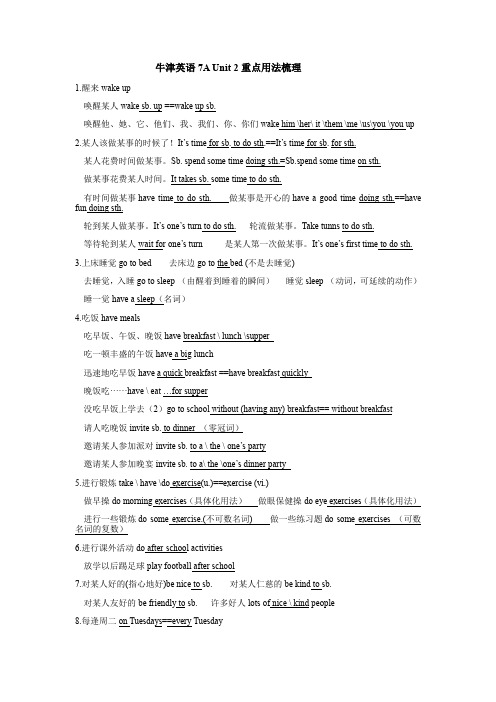
牛津英语7A Unit 2重点用法梳理1.醒来wake up唤醒某人wake sb. up ==wake up sb.唤醒他、她、它、他们、我、我们、你、你们wake him \her\ it \them \me \us\you \you up 2.某人该做某事的时候了!It’s time for sb. to do sth.==It’s time for sb. for sth.某人花费时间做某事。
Sb. spend some time doing sth.=Sb.spend some time on sth.做某事花费某人时间。
It takes sb. some time to do sth.有时间做某事have time to do sth. 做某事是开心的have a good time doing sth.==have fun doing sth.轮到某人做某事。
It’s one’s turn to do sth. 轮流做某事。
Take tunns to do sth.等待轮到某人wait fo r one’s turn 是某人第一次做某事。
It’s one’s first time to do sth.3.上床睡觉go to bed 去床边go to the bed (不是去睡觉)去睡觉,入睡go to sleep (由醒着到睡着的瞬间)睡觉sleep (动词,可延续的动作)睡一觉have a sleep(名词)4.吃饭have meals吃早饭、午饭、晚饭have breakfast \ lunch \supper吃一顿丰盛的午饭have a big lunch迅速地吃早饭have a quick breakfast ==have breakfast quickly晚饭吃······have \ eat …for supper没吃早饭上学去(2)go to school without (having any) breakfast== without breakfast请人吃晚饭invite sb. to dinner (零冠词)邀请某人参加派对invite sb. to a \ the \ one’s party邀请某人参加晚宴invite sb. to a\ the \one’s dinner party5.进行锻炼take \ have \do exercise(u.)==exercise (vi.)做早操do morning exercises(具体化用法)做眼保健操do eye exercises(具体化用法)进行一些锻炼do some exercise.(不可数名词) 做一些练习题do some exercises (可数名词的复数)6.进行课外活动do after-school activities放学以后踢足球play football after school7.对某人好的(指心地好)be nice to sb. 对某人仁慈的be kind to sb.对某人友好的be friendly to sb. 许多好人lots of nice \ kind people8.每逢周二on Tuesdays==every Tuesday在周二on Tuesday 在周二上午、下午、晚上on Tuesday morning \ afternoon \ evening 每周二的上午on Tuesday mornings ==every Tuesday morning9.她是一个很棒的游泳者。
牛津译林 7A Unit 2单词知识点讲义设计(word文档)

7A Unit 2单词知识点讲义1. walking n.散步,步行walk v./n.步行,散步like walking(喜欢散步) go walking去散步walk to school=go to school on foot(步行去上学) walk home=go home on foot(步行回家)He walks to school every day.How does he go to school every day?take/have a walk 散步,go for a walk 去散步go out for a walk 出去散步go walking =go for a walk(去散步)2. rea lly /ˈrɪəlɪ/ adv. (答话时表示惊讶或感兴趣)的确,确实—We are winners.—Really?It’s really hot today.I really like English.( 我真的喜欢英语) I’m really sorry for being late.real adj. look real (看上去真的)3. bowl /əʊ/ n.碗,盆 a bowl of ricea bowl of rice一碗米饭4. time n. (C)次,回一次once, 两次twiceI walk to my bowl many times a day.(一天几次,对频率提问用how often)I watch TV three times a week.do you watch TV? I watch TV three times a day.do you watch TV?我一周玩两次电脑游戏I play computer games.5. play tennis/volleyball/table tennisa tennis/volleyball player6. enjoy (enjoys,enjoyed) vt.享受…的乐趣;喜爱,喜欢,欣赏, 后加名词或动名词enjoy sth/doing sthHe enjoyed the food very much.The cat enjoys its meals very much.They enjoyed her singing.He enjoys swimming.He (喜欢) (listen)tomusic.喜欢听音乐enjoy/like/love listening tomusic7. go swimminggo + 动名词”表示去“去做某事”,常用于从事某一体育运动或休闲娱乐运动。
Unit2知识点整理牛津译林版七年级英语上册

7A Unit 2 知识点整理1.many times a day 一天许多次once一次/twice两次/...times ......次Eddie walks to his bowl three times a day.(对画线部分提问)How often does Eddie walk to his bowl?Eddie walks to his bowl three times a day.(对画线部分提问)How many times does Eddie walk to his bowl a day.2.walk to my bowl 走向我的碗walk home 步行回家(此处home副词,前面不加to)4.What/ How about doing sth. 做......怎么样?What/How about going swimming? 去游泳怎么样?5.What’s your favourite sport?你最喜欢的运动是什么?6.my favourite football player我最喜爱的足球运动员sb’s favourite football player(sb’s:my/your/his/her/our/their)play(v.)player(n.)类似的变化:teachteacher swimswimmer writewriter singsinger7.be a member of ...=be in... ...的一名成员He is a member of Huanghe Football Club.=He is in Huanghe Football Club.8.look happy(adj.) 看起来高兴(look是感官动词,后接形容词) look/taste尝起来/smell闻起来/sound听起来/feel摸起来+形容词look at sb. happily(adv.) 高兴地看着某人(look实义动词,用副词修饰)My parents look happy and they look at me happily.9.play football very well足球踢得非常好(very well副词修饰动词play)10.What does he look like?=How does he look?He looks slim.他看起来怎么样?(提问外貌)他看起来苗条。
牛津英语七年级上7AUnit2知识点归纳

Page 221 Is it time for breakfast7是吃早饭的时间了吗?▲陈述句为:It's time for breakfast.句型it's time for的意思还可以用it’s time to do …来表。
如:(a)It's time for playing football.是踢球的时间了。
此句可以转化为:It's time to play football.(b)It's time for English class.是上英语课的时间了此句可以转化为:It's time to have English class.2 Some dogs just don't know how to have fun.一些狗就是不懂得怎么玩。
▲have fun的意思是“嬉戏”,“娱乐”,fun为不可数名词。
fun有时也可以作形容词,意思是“有趣的,令人愉快的”。
如:(a)Swimming in the sea is great fun!在海里游泳是件很有趣的事。
(b)The game sounds fun.这个游戏听上去很有趣。
、△米莉有个名叫汤米的新网友,她正在告诉他有关她新学校的事情。
△向你的网友讲讲你的学校生活,然后完成网友俱乐部网站的快乐图表。
Page 23A下面是米莉的一篇日记。
你也想写篇日记。
将你的日常活动填人下面日记的各项内Do morning exercises做早操▲do exercise意思是“做运动”,也可说take exercise。
如:Do at least 30 minutes exercise every day.每天最少做30分钟运动。
Page 24A米莉写了封邮件给她的新网友汤米。
下面是她写的电子邮件。
1 Amy is my best friend.埃米是我最好的朋友。
▲best是形容词good的最高级。
Unit 2 重点词组 牛津译林版英语七年级上册
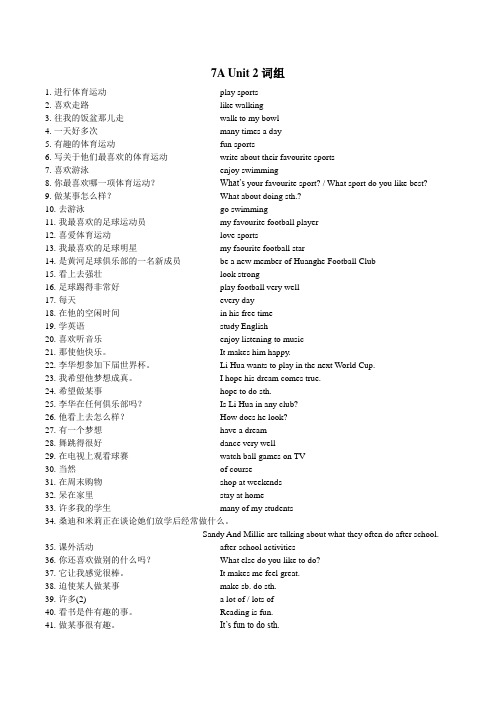
7A Unit 2词组1.进行体育运动play sports2.喜欢走路like walking3.往我的饭盆那儿走walk to my bowl4.一天好多次many times a day5.有趣的体育运动fun sports6.写关于他们最喜欢的体育运动write about their favourite sports7.喜欢游泳enjoy swimming8.你最喜欢哪一项体育运动?What’s your favourite sport? / What sport do you like best?9.做某事怎么样?What about doing sth.?10.去游泳go swimming11.我最喜欢的足球运动员my favourite football player12.喜爱体育运动love sports13.我最喜欢的足球明星my faourite football star14.是黄河足球俱乐部的一名新成员be a new member of Huanghe Football Club15.看上去强壮look strong16.足球踢得非常好play football very well17.每天every day18.在他的空闲时间in his free time19.学英语study English20.喜欢听音乐enjoy listening to music21.那使他快乐。
It makes him happy.22.李华想参加下届世界杯。
Li Hua wants to play in the next World Cup.23.我希望他梦想成真。
I hope his dream comes true.24.希望做某事hope to do sth.25.李华在任何俱乐部吗?Is Li Hua in any club?26.他看上去怎么样?How does he look?27.有一个梦想have a dream28.舞跳得很好dance very well29.在电视上观看球赛watch ball games on TV30.当然of course31.在周末购物shop at weekends32.呆在家里stay at home33.许多我的学生many of my students34.桑迪和米莉正在谈论她们放学后经常做什么。
牛津译林英语7A Unit2知识点

牛津英语7A Unit2重点知识点一、重点词汇和短语1.非常喜欢散步like walking very much2.步行上学walk to school = go to school on foot3.两碗饭two bowls of rice4.一天一次/ 两次/许多次once / twice a day / many times a day5.踢足球/打篮球/ 排球play football / basketball / volleyball6.我最喜欢的运动/足球明星my favourite sport / football star7.喜欢听音乐enjoy listening to music8.你呢?What about you?9.去钓鱼怎么样?What about / How about going fishing?10.参加读书俱乐部be in / be a member of the Reading Club11.篮球打得好/舞跳得好play basketball well / dance well12.看起来强look strong13.在他的空暇时间in his free time14.使他(感到)开心make him (feel) happy15.想要做某事want / would like to do sth16.踢下一届世界杯play in the next World Cup17.变成现实come true18.通过电视看球赛watch the ball games on TV19.在周末at / on the weekendat / on weekends20.我的许多学生many of my students21.别的什么/还有谁what else / who else22.许多英雄 a lot of / lots of heroes23.一本有趣的书an interesting book24.对….感兴趣be interested in (sth / doing sth)二、重要语言点1.time:(1)时间(不可数)have much time to play basketball 有许多时间打篮球(2)次数(可数)many times2.enjoy: 喜欢;享受(1)enjoy doing sth 喜欢做某事(2)enjoy oneself玩的开心= have a good time3.你最喜欢的运动是什么?Which sport do you like best? = What’s your favourite sport?4.make:(1)制作make a kite 制作风筝(2)使某人….make sb happy 使某人高兴5.want = would like 想要…want / would like sth / to do sth 想做某事6.hope: v.希望(1)hope to do sthEg. I hope to go to Beijing.我希望去北京。
牛津英语知识点归纳系列 7A Unit2
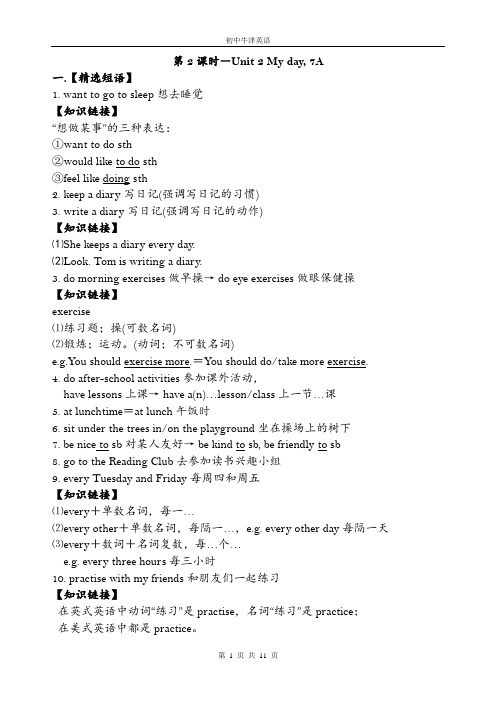
第2课时-Unit 2 My day, 7A一.【精选短语】1. want to go to sleep想去睡觉【知识链接】“想做某事”的三种表达:①want to do sth②would like to do sth③feel like doing sth2.keep a diary写日记(强调写日记的习惯)3.write a diary写日记(强调写日记的动作)【知识链接】⑴She keeps a diary every day.⑵Look. Tom is writing a diary.3. do morning exercises做早操→ do eye exercises做眼保健操【知识链接】exercise⑴练习题;操(可数名词)⑵锻炼;运动。
(动词;不可数名词)e.g.You should exercise more.=You should do/take more exercise.4.do after-school activities参加课外活动,have lessons上课→have a(n)…lesson/class上一节…课5.at lunchtime=at lunch午饭时6. sit under the trees in/on the playground坐在操场上的树下7. be nice to sb对某人友好→ be kind to sb, be friendly to sb8. go to the Reading Club去参加读书兴趣小组9. every Tuesday and Friday每周四和周五【知识链接】⑴every+单数名词,每一…⑵every other+单数名词,每隔一…,e.g. every other day每隔一天⑶every+数词+名词复数,每…个…e.g. every three hours每三小时10. practise with my friends和朋友们一起练习【知识链接】在英式英语中动词“练习”是practise,名词“练习”是practice;在美式英语中都是practice。
新牛津7AUnit2知识点(完整资料).doc

【最新整理,下载后即可编辑】7AUnit2知识点Welcome to the unit &Reading1、 like1) v.喜欢2) prep.像look like 看起来像eg.He looks like his father. 他看起来像他的爸爸。
2、 walk to ……走向……eg. walk to school 走去学校 = go to school on footwalk home 走回家固定搭配:① take/have a walk 散步② go for a walk 去散步③ take sb. for a walk 带某人散步④ take a dog for a walk 遛狗3、many times a day 一天许多次once a day 一天一次twice a week 一星期两次like to do sth. 想要做某事(一次性) like doing sth 喜欢做某事(习惯、爱好) Sandy likes playing tennis.I like to go shopping this afternoon.time 时代 a new time 一个新的时代 时间(不可数) what time 什么时候次数(可数) three times 三次 (提问时用 how often)five times a year 一年五次3、 喜欢做某事* enjoy oneself 过得愉快;玩得开心 = have a good time4、 what about = how about +(doing) sth. ……怎么样?What/How about going to the cinema on the weekend? 这周末去看电影怎么样?5、5、 very much 非常 = a lotThank you very much. 非常感谢。
I like football very much. 我非常喜欢足球。
新译林牛津版七年级上册第二单元默写归纳
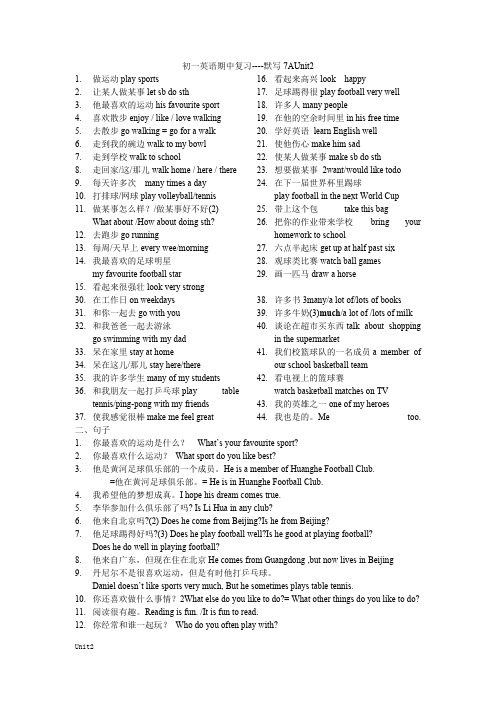
1.做运动play sports2.让某人做某事let sb do sth3.他最喜欢的运动his favourite sport4.喜欢散步enjoy / like / love walking5.去散步go walking = go for a walk6.走到我的碗边walk to my bowl7.走到学校walk to school8.走回家/这/那儿walk home / here / there9.每天许多次many times a day10.打排球/网球play volleyball/tennis11.做某事怎么样?/做某事好不好(2)What about /How about doing sth?12.去跑步go running13.每周/天早上every wee/morning14.我最喜欢的足球明星my favourite football star15.看起来很强壮look very strong 16.看起来高兴look happy17.足球踢得很play football very well18.许多人many people19.在他的空余时间里in his free time20.学好英语learn English well21.使他伤心make him sad22.使某人做某事make sb do sth23.想要做某事2want/would like todo24.在下一届世界杯里踢球play football in the next World Cup25.带上这个包take this bag26.把你的作业带来学校bring yourhomework to school27.六点半起床get up at half past six28.观球类比赛watch ball games29.画一匹马draw a horse30.在工作日on weekdays31.和你一起去go with you32.和我爸爸一起去游泳go swimming with my dad33.呆在家里stay at home34.呆在这儿/那儿stay here/there35.我的许多学生many of my students36.和我朋友一起打乒乓球play tabletennis/ping-pong with my friends37.使我感觉很棒make me feel great 38.许多书3many/a lot of/lots of books39.许多牛奶(3)much/a lot of /lots of milk40.谈论在超市买东西talk about shoppingin the supermarket41.我们校篮球队的一名成员a member ofour school basketball team42.看电视上的篮球赛watch basketball matches on TV43.我的英雄之一one of my heroes44.我也是的。
牛津英语7AUnit2Let‘splaysports重点用法梳理

牛津英语7AUnit2Let‘splaysports重点用法梳理牛津英语7A Unit 2重点用法梳理1.醒来wake up唤醒某人wake sb. up ==wake up sb.唤醒他、她、它、他们、我、我们、你、你们wake him \her\ it\them \me \us\you \you up 2.某人该做某事的时候了!It’s time for sb. to do sth.==It’s time for sb. for sth.某人花费时间做某事。
Sb. spend some time doing sth.=Sb.spend some time on sth.做某事花费某人时间。
It takes sb. some time to do sth.有时间做某事have time to do sth. 做某事是开心的have a good time doing sth.==have fun doing sth.轮到某人做某事。
It’s one’s turn to do sth. 轮流做某事。
Take tunns to do sth.等待轮到某人wait fo r one’s turn 是某人第一次做某事。
It’s one’s first time to do sth.3.上床睡觉go to bed 去床边go to the bed (不是去睡觉)去睡觉,入睡go to sleep (由醒着到睡着的瞬间)睡觉sleep (动词,可延续的动作)睡一觉have a sleep(名词)4.吃饭have meals吃早饭、午饭、晚饭have breakfast \ lunch \supper吃一顿丰盛的午饭have a big lunch迅速地吃早饭have a quick breakfast ==have breakfast quickly晚饭吃have \ eat 。
for supper没吃早饭上学去(2)go to school without (having any) breakfast== without breakfast请人吃晚饭invite sb. to dinner (零冠词)邀请某人参加派对invite sb. to a \ the \ one’s party邀请某人参加晚宴invite sb. to a\ the \one’s dinner party5.进行锻炼take \ have \do exercise(u.)==exercise (vi.)做早操do morning exercises(具体化用法)做眼保健操do eye exercises(具体化用法)进行一些锻炼do some exercise.(不可数名词) 做一些练习题do some exercises (可数名词的复数)6.进行课外活动do after-school activities放学以后踢足球play football after school7.对某人好的(指心地好)be nice to sb. 对某人仁慈的be kind to sb.对某人友好的be friendly to sb. 许多好人lots of nice \ kind people8.每逢周二on Tuesdays==every Tuesday在周二on Tuesday 在周二上午、下午、晚上on Tuesday morning \ afternoon \ evening 每周二的上午on Tuesday mornings ==every Tuesday morning9.她是一个很棒的游泳者。
牛津译林7AUnit1和Unit2考试要点
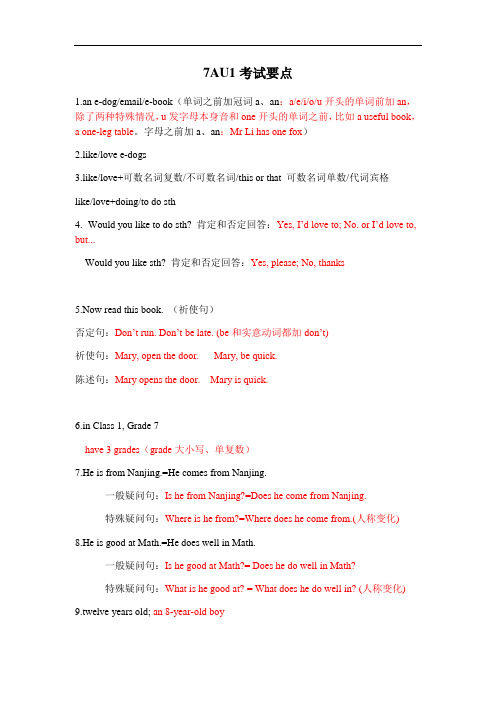
7AU1考试要点1.an e-dog/email/e-book(单词之前加冠词a、an:a/e/i/o/u开头的单词前加an,除了两种特殊情况,u发字母本身音和one开头的单词之前,比如a useful book,a one-leg table。
字母之前加a、an:Mr Li has one fox)2.like/love e-dogs3.like/love+可数名词复数/不可数名词/this or that 可数名词单数/代词宾格like/love+doing/to do sth4.Would you like to do sth? 肯定和否定回答:Yes, I’d love to; No. or I’d love to, but...Would you like sth? 肯定和否定回答:Yes, please; No, thanks5.Now read this book. (祈使句)否定句:Don’t run. Don’t be late. (be和实意动词都加don’t)祈使句:Mary, open the door. Mary, be quick.陈述句:Mary opens the door. Mary is quick.6.in Class 1, Grade 7have 3 grades(grade大小写、单复数)7.He is from Nanjing.=He comes from Nanjing.一般疑问句:Is he from Nanjing?=Does he come from Nanjing.特殊疑问句:Where is he from?=Where does he come from.(人称变化)8.He is good at Math.=He does well in Math.一般疑问句:Is he good at Math?= Does he do well in Math?特殊疑问句:What is he good at? = What does he do well in? (人称变化)9.twelve years old; an 8-year-old boy10.---Are you happy? ---Yes, I am.(I与am不可缩写)11.Are you....的两种肯定回答:Yes, I am/Yes, we are.---Are you...,Millie? ---Yes, I am.---Are you...., boys?---Yes, we are.12.---Is your name Millie?肯定回答:---Yes, it is.13.提问年龄:What’s your age?=How old are you?(人称变化)14.Glad to meet you.Nice to meet you.Happy to meet you.完整句:I am glad to meet you.(+to do)15.I am in Grade 7.一般疑问句:Are you in Grade 7.特殊疑问句:What grade are you in?(class的用法同上)16.live with sb in sp.米粒和她的家人住在南京(3种):Millie with her family lives in Nanjing.(就远原则-就近原则)Millie lives in Nanjing with her family.Millie and her family live in Nanjing.17.My family(后面动词的单复数)are all tall.(family是集体名词,常见的还有class,school,group,team)18.wear glasses/a pair of glassesThe boy with glasses is from Shanghai.(介词和动词之间的转换)19.all the lessons/all my booksAll of the lessons/all of my booksThey are all nice. They all run fast.7AU2考试要点1.walk to my bowl/walk to my school/walk home(here/there)=go home on foot2.I walk to my bowl three times a day.提问做某事的次数,用How many times:How many times a day do you walk to your bowl?(注:次数+时间间隔,相当于提问频率)提问做某事的频率,用how often(不加时间间隔):How often do you walk to your bowl?3.你最喜欢的运动是什么?What’s your favourite sport?= What sport do you like best?I like playing football best.=My favourite sport is playing football.4.What about you?What about some cakes?What about/how about going swimming?=Let’s go swimming.(+doing)5.He is a member of Huanghe Football Club.=He is in Huanghe Football Club.=He plays for Huanghe Football Club.6.make him happy, make the city dirty, make the city clean(make+n+adj)7.I hope (that) his dream comes true.(hope+句子)I hope to make his dream come true.(没有hope sb to do sth)8.He looks strong.(提问长相)如何提问How does he look?=what does he look like?=what is he like?他像他爸爸:He looks like his father.=He is like his father.9.What else=what other things; who else= what other peopleanything elsesomething else10.make me feel great(make+n+do)难点make his dream come trueI hope his dream comes true.7AU1考试要点1.an e-dog/email/e-book(单词之前加冠词a、an。
牛津7A Unit2重难点

7A Unit2 Let’s play sports! 重点词组、句型和知识点归纳一、词组1、非常喜欢散步like walking very much2、步行上学walk to school = go to school on foot3、两碗饭two bowls of rice4、一天一次/ 两次/许多次once / twice a day / many times a day5、踢足球/打篮球/ 排球/ 网球play football / basketball / volleyball/ tennis羽毛球/ 乒乓球/ 棒球badminton / table tennis / baseball6、我最喜欢的运动/ 足球明星my favourite sport / football star7、喜欢听音乐enjoy listening to music8、你呢?What about you?9、去钓鱼怎么样?What about / How about going fishing?10、参加读书俱乐部be in / be a member of the Reading Club11、篮球打得好/ 舞跳得好play basketball well / dance well12、看起来强壮look strong13、在他的空暇时间in his free time14、使他(感到)开心make him (feel) happy15、想要做某事want / would like to do sth16、踢下一届世界杯play in the next World Cup17、变成现实come true18、通过电视看球赛watch the ball games on TV19、在周末at / on the weekend // at / on weekends20、我的许多学生many of my students21、别的什么/ 还有谁what else / who else22、许多英雄 a lot of / lots of heroes23、一本有趣的书an interesting book24、对….感兴趣be interested in (sth / doing sth)25、谈论…talk about / of二、句型和知识点:1、time: 1) 时间(不可数)have _______ time _____________(有许多时间打篮球)2) 次数(可数)____________ a month (许多次)2、enjoy: 喜欢;享受1) enjoy doing sth2) enjoy oneself玩的开心= have a good time3、你最喜欢的运动是什么?Which sport _____ you _____ _____? = What’s your ______ sport?4、make: 1)制作make a kite2)使某人…. make sb happy / sad / strong / tired…/ make sb do sth锻炼使我们强壮。
新版牛津7A unit2

年级:七年级科目:英语课题Unit 2 Let’s play sports!教学目的【学习目标】:1 掌握常见的几种体育运动的名称,使用适当的语言言论体育运动2.掌握行为动词一般现在时的用法3.了解五个元音字母在重读闭音节中的发音教学内容Unit 2 Let's play sports词汇①反义词,dislike1. like,v. 喜欢② like sb./sth. (n.复数)③ like doing sth. (表示人的兴趣、爱好及经常性的活动)④ like to do sth. (表示偶然性、一次性的活动)⑤ love,be fond of2.sport,n. 运动sport指具体的某种运动项目时,作单数名词, sports泛指运动。
3.walk,v. 走,步行take a walk散步go for a walk去散步take sb. for a walk带某人去散步walk to sp. ,当后面是地点副词时,省略to,walk home,walk here walking,n. 散步,步行,不可数4. really,adv. 的确,真正地,用于答语中表示疑问、惊讶、恼怒等— He can speak Japanese. — Oh,really?5.time,可数名词,次、回How many times do you play football a week?不可数名词,时间It’s time for me to play sports.6.bowl,n. 碗,a bowl of 一碗。
7.tennis,n. 网球,play tennis table tennis a tennis player a game of tennis tennis ball8 .volleyball,n. 排球,play volleyball the volleyball match volleyball team9. what about=how about,寻求意见,。
牛津7AUnit2教学要求,知识点讲解和练习

7A Unit 2 My day【单元学习重点和要求】一、语音1.单词重读` cartoon `favourite `principal `badminton`practise `swimming `playground `modeltech`nology mu`seum ac`tivities infor`mation2.不完全爆破a(c)tivities frien(d)ship the Grea(t) Wall bi(g) trees the firs(t) prize 3.句子重音和语调Can I `borrow your ↗pen?Do you `have your ↗books?May I `watch ↗TV?Is she `tall and ↗slim?Are you ↗busy?Do you `like ↗music?二、词汇1.单词assembly activities playground snack tuck principal practise swimmer favourite model badminton cartoon information technology museum swimming organizing price trip slim 2.词组it’s time for+名词是做某事的时间了,该做某事了get up 起床after-school activities 课外活动have assembly 开晨会have lessons 上课eat breakfast/lunch/supper 吃早/中/晚餐do one’s homework做家庭作业watch TV 看电视go to bed 上床睡觉keep a diary 记日记a day at school 在学校的一天lots of 许多;大量have fun 娱乐,乐趣;开心more than 多于;超过twice a week 一星期两次swimming club 游泳俱乐部read comic books 看连环漫画书have (no) time to do sth. 有(没有)时间做某事chat with sb 和某人聊天/闲谈go swimming 去游泳I would like to+动词原形愿意干某事;想要干某事from...to…从……到……look forward to…期盼;盼望turn on 打开(电灯、电视、收音机等)Here it is! 给你!三、日常用语Is it time for breakfast? 是吃早饭的时候了吗?What are you going to do today? 今天你打算干什么?Please e-mail me soon! 请尽快给我发电子邮件!We are in Class 1, Grade 7. 我们在七年级一班。
牛津英语7Aunit 2知识点

7A Unit 2 Let's play sports!短语归纳:play sports 做运动 many times a day 一天许多次play football/tennis 踢足球/打网球 talk about 谈论after school 放学后 go swimming 去游泳a member of …中的一员 come from 来自listen to music 听音乐 in the next World Cup 在下届世界杯come true 实现 in one’s free time 在某人的空闲时间live in 住/生活在 read books 看书at/ on weekends=at/on the weekend在周末stay at home 待在家里 a lot of 许多ask sb about sth 问某人某事 on TV 在电视上Watch basketball matches 看篮球比赛 feel great 感觉特棒用法集萃:What/how about doing sth ?做…怎么样?Enjoy doing sth 喜欢做某事make sb/sth +adj 使某人/某物 make sb to do sth 使某人做某事Want/would like to do sth 想要做某事 hope to do sth 希望做某事have fun /have a good time /enjoy oneself doing sth 做某事开心典句必背I like walking. 我喜欢散步。
I enjoy swimming.What’s your favourite sport? 我喜欢游泳,他最喜欢的运动是什么?I hope his dream comes true. 我希望他梦想成真。
What does Li Hua do in his free time? 李华在业余时间做什么?What else do you want to do? 你还想做什么其他的事情?Reading is fun. 读书是有趣的事情。
牛津英语7Aunit2知识重点

牛津英语7Aunit2知识重点Unit2Welcome1. real adj. ---- really adv.. a real car 一辆真车. I am really sorry. 我真的抱歉。
. true adj. a true story 一个真实的故事. a true story about a real person 真人真事2. walk to my bowl = go to my bowl on foot 走到我的碗那儿去 . ride (a bike) to school = go to school by bike = go to school on a bike3. I walk to my bowl many times a day. (提问)---- How often do you walk to your bowl?. I go swimming every week. (提问)---- How often do you go swimming?4. 球类、棋类运动不加the.play volleyball/ basketball/ tennis/ table tennis/football/ badminton. play (Chinese) chess注意:play with a ball 玩球西洋乐器加the. play the piano/ violin5. be good at / do well in + doing …. like/ love/ enjoy + doing …6. What’s your favourite sport? 你最喜欢的运动是什么?= What sport do you like best?7. What/ How about +sth. ? What about some milk? 来些牛奶怎么样?What/ How about +doing sth? What about doing someshopping? 购物怎么样?What/ How about + 代词宾格? What about them? 他们呢?. ex. My dog is yellow. What about ____________ (you)?Reading1.my favouritefoot ball player 我最喜欢的足球选手one’s favourite …某人最喜爱的。
牛津英语7A第2单元知识点归纳.

牛津英语7A第2单元知识点归纳1. wake up / wake sb. up2. It is time for sth. / It is time to do sth. / It is time for sb. to do sth.3. What are you going to do today? We are going to visit the museum.4. go to bed / go to sleep5. Some dogs just don't know how to have fun. / have fun (in doing sth.6. Millie has a new e-friend called Tommy.7. tell sb. sth. / tell sb. about sth. / tell sb. to do sth.8. write a diary / keep a diary9. have an assembly / have a meeting10. do some after-school activities / some daily activities11. write (a letter to sb. / write an e-mail to sb.12. What can we call it? We can call it "Assembly Hall".It is called "Assembly Hall".13. more than 1800 students14. I like my classroom because I can see the playground.15. Sometimes we buy snacks from the tuck shop.16. the whole school / all the students / all the other students17. My favourite lessons are Chinese and English.18. I spend about an hour a day doing my homework.spend (time / money on sth. / spend (time / money (in doing sth.19. Sometimes we practise playing volleyball after school.20. There are lots of things to do at my school.21. Please e-mail me soon.= Please write an e-mail to me soon.22. improve your skills / improve your English23. twice a week / three times a month / five times a year24. make model planes25. watch football matches on TV26. Do you know where Mr Wu is?27. She walks Eddie every day.28. They live near each other.29. I have some news. Is it good news? / a piece of news30. win the first prize in the football match31. both / all : We are both students. / We are all students.32. all the time33. meet up with sb.34. on Monday / on Mondays35. go to dancing lessons36. be busy with sth. / be busy doing sth.37. She doesn't have much time to chat with her friends. ( have time to do sth.38. go on a trip= have a trip / organize the class trip39. get some information about…40. the China space museum / the China science and technology museum41. Each student can spend ¥10.42. every day except Monday43. Thank you for sth. / Thank you for doing sth.44. the price for each student / The price is too high.45. The zoo is open from 7:30 a.m to 5:00 p.m.46. We are all looking forward to a great day out. / look forward to seeing you soon.47. ask your friends and teacher for help48. forget to do sth. / forget doing sth.49. Can I borrow some money from you? Sorry, you can't! I don't have any.50. turn on the lights / turn off the radio51. I am not tall enough to reach the basket.52. I love reading because I want to learn more about the world.53. It is fun to look at the pictures when I finish drawing them.54. I like some parts of the days and I dislike others.55. I dislike playing the piano and doing homework because they are boring and they take long.56. Do you know the answer to Number Two?57. hear from sb.= get a letter from sb.58. Watching TV too much is not good for our eyes.59. an adult ticket / a child's ticket60. be free = have time61. Thank you for inviting me to a film with you.62. Anything is OK with me.63. pass me some apples = pass some apples to me(pass sb. sth. = pass sth. to sb.。
- 1、下载文档前请自行甄别文档内容的完整性,平台不提供额外的编辑、内容补充、找答案等附加服务。
- 2、"仅部分预览"的文档,不可在线预览部分如存在完整性等问题,可反馈申请退款(可完整预览的文档不适用该条件!)。
- 3、如文档侵犯您的权益,请联系客服反馈,我们会尽快为您处理(人工客服工作时间:9:00-18:30)。
7AUnit2知识点Welcome to the unit &Reading1、 like1) v.喜欢2) prep.像look like 看起来像eg.He looks like his father. 他看起来像他的爸爸。
2、 walk to ……走向……eg. walk to school 走去学校 = go to school on footwalk home 走回家固定搭配:① take/have a walk 散步② go for a walk 去散步③ take sb. for a walk 带某人散步④ take a dog for a walk 遛狗3、many times a day 一天许多次 once a day 一天一次 twice a week 一星期两次five times a year 一年五次 3、 喜欢做某事* enjoy oneself过得愉快;玩得开心 = have a good time 4、 what about = how about +(doing) sth. ……怎么样? What/How about going to the cinema on the weekend? 这周末去看电影怎么样5、 5、 very much 非常 = a lot Thank you very much. 非常感谢。
I like football very much. 我非常喜欢足球。
6、a member of …… ……的成员 a member of Reading Club 读书俱乐部的成员7、 Simon comes from Nanjing. (对划线部分提问)Where does Simon come from?Simon is from Nanjing. (对划线部分提问)Where is Simon from?8、 favourite = like bestWhich is your favourite season? = Which season do you like best? 你最喜欢什么季节like to do sth. 想要做某事(一次性) like doing sth 喜欢做某事(习惯、爱好) Sandy likes playing tennis.I like to go shopping this afternoon.time 时代 a new time 一个新的时代 时间(不可数) what time 什么时候 次数(可数)three times 三次 (提问时用 how often)like doing sth. love doing sth.enjoy doing sth. go fishing 去钓鱼walking 去散步shopping 去购物 camping 去野营boating 去划船sailing 去远航My favourite season is winter. = I like winter best. 我最喜欢冬天。
9、 look10、 11、in free time 在空余时间 12、study n.书房 My father is in his study now.v.学习 He studies English.13、listen to sth. 听……listen to music 听音乐14、 15、want to do sth. 想要做某事 I want to be a teacher. 我想要成为一名老师。
16、hope 希望 hopeful 有希望的 hopeless 没有希望的 hope to do sth. 希望做某事He hopes to be strong. 他希望变强壮。
hope (that)+句子He hopes (that) he can be strong. 他希望他能变强壮。
7AUnit2知识点Grammar & Integrated skills & Task1、行为动词的一般现在时用法我们常用一般现在时谈论我们经常做的事,目前的爱好,能力等以及不受时限的客观事实。
这时我们常使用行为动词,这种动词有具体实际的含义。
请比较:They are hard-working students. 他们是勤奋的学生。
(动词be )They work hard. 他们学习很努力。
(行为动词)注意:当我们用一般现在时进行表达的时候,不能同时使用be 和行为动词。
如:I am from China. (√)I come from China. (√)I am come from China. (×)根据主语的人称和数的不同,行为动词的一般现在时有两种形式。
当主语是第一,第二人称和第三人称复数时,行为动词使用其原型。
如:We have lunch at school. 我们在学校吃午餐。
My parents watch films at weekends. 我的父母周末看电影。
当主语是第三人称单数时,行为动词使用其第三人称单数形式。
如:She does her homework in the evening. 她晚上写家庭作业。
He plays football every day. 他每天踢足球。
(连系动词)看起来(后面跟形容词) He looks very strong.他看起来很强壮。
(实意动词)看 look at sth. Look at the picture 看这幅图。
形容词(adj )指身体好的 He is well. 他(身体)很好。
副词(adv )好地 He plays basketball well. 他篮球打得很好。
well make sth./sb. + adj. 使某物/某人…… make him happy 使他开心make sb. do sth. 让某人做某事 make him clean the window 让他擦窗户make sth. for sb.= make sb. sth. 为某人做某事make a cake for him = make him a cake 为他做一个蛋糕单数时,助动词用does。
在非正式行文中,do not 和does not 可以缩写成don’t 和doesn’t.如:Students do not go to school on Sunday. 学生周日不上学。
He does not work in this shop. 他不在这家商店工作。
行为动词一般现在时的疑问句式是在句首添加助动词do或does,当主语是第三人称单数时,助动词用does.如:-Do you play basketball after class? 你放学后打篮球吗-Yes, I do. 是的,我打篮球。
-Does John speak Chinese? 约翰说中文吗-No, he doesn’t. 不,他不说中文。
注意:在疑问句和否定句中,助动词之后的行为动词均用原形。
区分行为动词do和助动词do的用法。
如:I do not do housework on Saturday. 我周六不做家务。
Do you do housework on Saturday? 你周六不做家务吗(第一个do是助动词,第二个do是行为动词)2、在周末at/on weekendsat/on the weekend当与this、that、last、next、every搭配时,不用at/onEg. this weekend 这周末next weekend 下周末3、of course 当然of course not 当然不4、else 别的;其他;另外;否则1)else作为形容词时常作为后置定语,即放在who,what,which,when,where,how等后面。
Eg.Who else can you see ? 你还能看见什么人What else do you want ? 你还要别的什么Where else do you want to go ? 你还想去别的地方吗When else can I meet you ? 我其他什么时间可以与你见面2)else置于不定代词的后面Eg. nothing else 没有其他东西了anybody else 其他任何人somewhere else 其他一些地方区别:other 其他的other 放在名词的前面,用来修饰名词other places 其他地方5、a lot of = lots of 许多的;大量的 既可以修饰可数名词,也可以修饰不可数名词a lot of friends 许多朋友a lot of bread 许多面包* a lot 相当于 very muchThanks a lot. = Thanks very much.6、 7、动名词作主语,谓语动词用三单形式。
Eg. Reading is fun. 读书很有乐趣。
Learning English is very important to us. 学习英语对于我们很重要。
8、talk9、看10、以“o ”结尾加“es ”的名词potato potatoes 土豆tomato tomatoes番茄 hero heroes 英雄interesting 有趣的 一般情况下跟物 an interesting book 一本有趣的书(也可以指某人是有趣的 She is an interesting girl.她是一个有趣的女孩。
)interested 感到有趣的 be interested in sth. 对某物感兴趣 He is interested in football . 他对足球感兴趣。
talk about/of ……谈到或谈起某事,谈论,议论 talk with sb. 和某人交谈 talk to sb. 对某人说话 give a talk 作报告 talk show 脱口秀 watch 注视;监视 I don ’t like to watch TV . 我不喜欢看电视。
look at 表示看的动作 Look at the picture,please. 请看这幅图片。
see 强调看的结果,指视力 We look at the blackboard but can ’t see anything. 我们看黑板但是什么也没看到。
read 指看书看报纸等等,指用大脑思考,含有阅读的意思。
read the book 看书。
